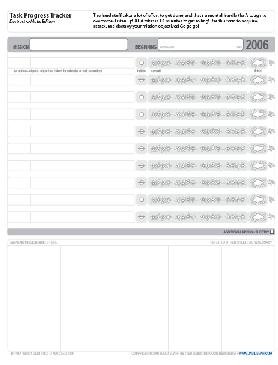Thanks to Lucy, who called my attention to it, I have recently been using this.
David Seah's Task Destruct-o-Matic.
It's a little worksheet that looks like this (but bigger):

And now I'm going to tell you why you should all use it too.* Bullet-point style.
- It helps me start on a task I am procrastinating about. Because I can tell myself I just have to do 15 minutes of work and then I get to colour in! a little circle! with a pencil! Seriously. This is enough reward for me. And everyone has enough motivation to work for 15 minutes, right?
- It keeps me focused on a task, rather than wandering off every five minutes to go to the loo, make a cup of coffee, chat to someone in the corridor, or rearrange my bookshelves into reverse alphabetical order.** Because when I get the urge to do these things, I look at my clock, see I have only 3 or 4 minutes left of a 15 minute block, and decide to wait until the 15 minutes is past so I can colour in another circle. Then I'll go to the loo. But I get engrossed in the task again, and don't look at the clock until it's 7 minutes into the next 15 minute period, and then I have to wait another 8 minutes, right? And this cycle continues for ever, until I complete the task or my bladder explodes, which often comes first.
- At the end of a day, I can look at the little coloured-in things and see exactly how much time I have spent on really working, and how much I have frittered away sharpening my pencils. I have started calculating how "research efficient" I have been each day, which no doubt means I am destined for a career in academic administration. But I really do find that trying to beat my previous day's efficiency is a great incentive to work harder.
- On a similar note, I am remarkably bad at calculating in advance how long a task is likely to take me. I tend to allow three days for a 20 minute task, which means I then procrastinate and stretch the task out until it takes three days after all, so that I don't have to deal with the realisation that I suck at time management. Using this worksheet means I have a record of how many 15 minute slots a task has taken, and then next time I know exactly how much of my week to allocate for it.
Some interesting statistics I have discovered in the last week or so of navel-gazing workaholism:
- The maximum efficiency I seem to be able to handle on an all-writing day is a little under 50%. Which means I shouldn't have all-writing days. In future I think I will plan at most to write for 40% of the hours I am in my office, and have other brainless tasks lined up for the rest of the time.
- I write pretty consistently at 800 words per hour (as long as I really have completed the necessary research for a chapter before I start writing). This discovery is unbelievably helpful for planning how long it will take me to write various thesis sections.
- I consistently complete 45 minutes of work in a one hour time period. This is because of unavoidable interruptions (phone ringing, people dropping in, having to go to the loo, etc).
- I cannot write solidly for more than an hour and a half without my brain going all slow and furry. Like a caterpillar, in fact.
The four points above mean that I have me a recipe to apply for a writing day.
Eg. for a day when I want to write 2000 words, I need 2.5 hours of actual writing time, which I can assume will take me 3 hours and 20 minutes, allowing for interruptions. This means I need to be in my office for at least 8 hours and 20 minutes, with other tasks to fill in the gaps. And obviously I would then try and split those 3 hours and 20 minutes into evenly spaced blocks of an hour and a half or less.
I always thought I was more efficient than this, so these are some pretty scary discoveries. But at least I now know what I need to do to achieve my goals, and maybe I'll even find I get more efficient with practice.
In conclusion, I highly recommend Task Destruct-o-Matic or its less rewarding juvenile version, the Task Progress Tracker, to anyone else with OCD tendencies or to those who, like me, have been lured by excessive exposure to computer games into expecting rewards for every little task or half-task they complete. Of course, if your idea of a reward goes beyond colouring in a little printed bubble, then this may not be the motivational tool for you.
The end (except for the footnotes).
_____
* I promise he isn't paying me.
** This confuses the elves.





3 Comments:
Wow, you're making great use of the form! Thanks for writing up your experiences with it! Good luck with the writing efficiency discover process! :-)
Of course, you can pay me if you like :)
(Disregard this comment: I'm drunk)
Hey, awesome tool! How neat to have a record of what you *have* done, not what you need, intend, or hope to get done. Fantastic.
BTW kudos for writing 800wph. That is a LOT, even if you can only do it 40% of the time :-D
Talk to me! (You know you want to!)